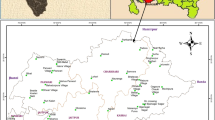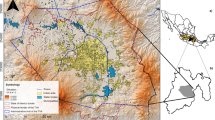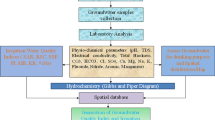Abstract
The present study is aimed to assess the spatial variation of groundwater quality based on the influencing hydrogeological parameters in the surrounding mining areas of India’s one of the largest coal fields, the Korba coal field, Chhattisgarh, Central India. To achieve this goal, a knowledge-driven approach with the aid of a Machine Learning (ML) decision tree-based model, i.e., Classification and Regression Tree (CART) model, was developed to predict possible factors contributing to the degradation of groundwater quality in the selected regions. A total of five influencing factors were selected viz., water table depth (WTD), groundwater drawdown (DR), slope (S), elevation (E), and distance to mines (DTM), which were considered as the important input variables. Groundwater Quality Index (GWQI) values of 216 locations within a buffer zone of 20 km centered from the coal mining area were assigned as the target variables in the CART model. The influences of these factors on groundwater quality were assessed using a recursive partitioning combined with a pruned algorithm. Results showed that the significant factors followed decreasing trend of S (34%) > DTM (23%) > WTD (16%) > DR (15%) > E (12%). The model predicted relatively higher GWQI values attributed to the available lower ground slope in the study area. Similarly, wells situated within a 3 km radius of the buffer zone had low groundwater quality apparently due to the influence of mines. Higher GWQI values were observed in the wells having low WTD value (˂7.9 m) and higher DR in the study area. The results suggested that the anthropogenic activity is one of the major sources of groundwater contamination, whereas the impact of mines was only observed within a radius of 3 km from the center of the mining areas.










Similar content being viewed by others
References
Abbasnia A, Yousefi N, Mahvi AH, Nabizadeh R, Radfard M, Yousefi M, Alimohammadi M (2019) Evaluation of groundwater quality using water quality index and its suitability for assessing water for drinking and irrigation purposes: Case study of Sistan and Baluchistan province (Iran). Hum Ecol Risk Assess 25:988–1005. https://doi.org/10.1080/10807039.2018.1458596
Ahmed U, Mumtaz R, Anwar H, Shah AA, Irfan R, García-Nieto J (2019) Efficient water quality prediction using supervised machine learning. Water 11:2210. https://doi.org/10.3390/w11112210
Akpoti K, Kabo-bah AT, Zwart SJ (2019) Agricultural land suitability analysis: State-of-the-art and outlooks for integration of climate change analysis. Agric Syst 173:172–208. https://doi.org/10.1016/j.agsy.2019.02.013
Al-Naeem AA (2014) Effect of excess pumping on groundwater salinity and water level in Hail region of Saudi Arabia. Res J Environ Toxicol 8:124–135. https://doi.org/10.3923/rjet.2014.124.135
Antunes A, Andrade-Campos A, Sardinha-Lourenço A, Oliveira MS (2018) Short-term water demand forecasting using machine learning techniques. J Hydroinf 20:1343–1366. https://doi.org/10.2166/hydro.2018.163
Anshumali, Rani M, Yadav SK, Kumar A (2014) Geochemical alterations in surface waters of Govind Ballabh Pant Sagar, Northern Coalfield. India. Environ Earth Sci 71(7):3181–3193. https://doi.org/10.1007/s12665-013-2706-3
Ardabili S, Mosavi A, Dehghani M, Várkonyi-Kóczy AR (2020) Deep learning and machine learning in hydrological processes climate change and earth systems a systematic review. In: Várkonyi Kóczy A (ed) Engineering for sustainable future. INTER-ACADEMIA 2019. Lecture notes in networks and systems. Springer, Cham, pp 52–62. https://doi.org/10.1007/978-3-030368418_5
Aslam RA, Shrestha S, Pandey VP (2018) Groundwater vulnerability to climate change: a review of the assessment methodology. Sci Total Environ 612:853–875. https://doi.org/10.1016/j.scitotenv.2017.08.237
Atiquzzaman M, Kandasamy J (2018) Robustness of extreme learning machine in the prediction of hydrological flow series. Comput Geosci 120:105–114. https://doi.org/10.1016/j.cageo.2018.08.003
Bahrami M, Khaksar E, Khaksar E (2020) Spatial variation assessment of groundwater quality using multivariate statistical analysis (Case Study: Fasa Plain, Iran). J Groundw Sci Eng 8:230–243. https://doi.org/10.19637/j.cnki.23057068.2020.03.004
Bata MT, Carriveau R, Ting DSK (2020) Short-term water demand forecasting using hybrid supervised and unsupervised machine learning model. Smart Water 5:1–18. https://doi.org/10.1186/s40713-020-00020-y
Bhagat SK, Tiyasha T, Tung TM, Mostafa RR, Yaseen ZM (2020) Manganese (Mn) removal prediction using extreme gradient model. Ecotoxicol Environ Saf 204:111059. https://doi.org/10.1016/j.ecoenv.2020.111059
BIS (1991) Indian standard, drinking water-specification, (first revision of IS 10500). Bureau of Indian Standards, New Delhi
Bouteraa O, Mebarki A, Bouaicha F, Nouaceur Z, Laignel B (2019) Groundwater quality assessment using multivariate analysis, geostatistical modeling, and water quality index (WQI): a case of study in the Boumerzoug-El Khroub valley of Northeast Algeria. Acta Geochim 38:796–814. https://doi.org/10.1007/s11631-019-00329-x
Bui DT, Pradhan B, Nampak H, Bui QT, Tran QA, Nguyen QP (2016) Hybrid artificial intelligence approach based on neural fuzzy inference model and metaheuristic optimization for floodsusceptibility modeling in a high-frequency tropical cyclone area using GIS. J Hydrol 540:317–330. https://doi.org/10.1016/j.jhydrol.2016.06.027
Bui DT, Khosravi K, Karimi M, Busico G, Khozani ZS, Nguyen H, Mastrocicco M, Tedesco D, Cuoco E, Kazakis N (2020) Enhancing nitrate and strontium concentration prediction in groundwater by using new data mining algorithm. Sci Total Environ 715:136836. https://doi.org/10.1016/j.scitotenv.2020.136836
Busico G, Cuoco E, Kazakis N, Colombani N, Mastrocicco M, Tedesco D, Voudouris K (2018) Multivariate statistical analysis to characterize/discriminate between anthropogenic and geogenic trace elements occurrence in the Campania Plain, Southern Italy. Environ Pollut 234:260–269. https://doi.org/10.1016/j.envpol.2017.11.053
Cresson R (2018) A framework for remote sensing images processing using deep learning techniques. IEEE Geosci Remote Sens Lett 16:25–29. https://doi.org/10.1109/LGRS.2018.2867949
Cude CG (2001) Oregon water quality index a tool for evaluating water quality management effectiveness 1. J Am Water Resour Assoc 37:125–137. https://doi.org/10.1111/j.1752-1688.2001.tb05480.x
Daryono LR, Wijayaningsih MSD, Hendratno A, Nukman M, Hartantyo E, Kawasaki S (2019) Geological spatial plan toward groundwater resources in Kertek, Wonosobo Basin, Central Java, Indonesia. J Degrad Min Lands Manag 6:1595. https://doi.org/10.15243/jdmlm.2019.062.1595
Dhakate R (2020) Distribution of aquifer characteristics in different geomorphologic units in a granitic terrain. Appl Water Sci 10:1–12. https://doi.org/10.1007/s13201-020-01313-0
Ehya F, Marbouti Z (2016) Hydrochemistry and contamination of groundwater resources in the Behbahan plain, SW Iran. Environ Earth Sci 75:455. https://doi.org/10.1007/s12665-016-5320-3
El Baba M, Kayastha P, Huysmans M, De Smedt F (2020) Evaluation of the groundwater quality using the water quality index and geostatistical analysis in the Dier al-Balah Governorate, Gaza Strip, Palestine. Water 12:262. https://doi.org/10.3390/w12010262
Flowers GE (2018) Hydrology and the future of the Greenland Ice Sheet. Nat Commun 9:1–4. https://doi.org/10.1038/s41467-018-05002-0
Gaiero DM, Pesci HE, Depetris PJ (1998) Effects of quarry mining and of other environmental impacts in the mountainous Chicam-Toctina drainage basin (Cordoba, Argentina). Environ Geol 34:159–166. https://doi.org/10.1007/s002540050267
Granata F (2019) Evapotranspiration evaluation models based on machine learning algorithms: a comparative study. Agric Water Manag 217:303–315. https://doi.org/10.1016/j.agwat.2019
Gulgundi MS, Shetty A (2018) Groundwater quality assessment of urban Bengaluru using multivariate statistical techniques. Appl Water Sci 8:43. https://doi.org/10.1007/s13201018-0684-z
Gupta P, Sarma K (2013) Evaluation of groundwater quality and depth with respect to different land covers in Delhi, India. Int J Appl Sci Eng Res 2:630–643
Ibrahim MN (2019) Assessing groundwater quality for drinking purpose in Jordan: Application of water quality index. J Ecol Eng 20:101–111. https://doi.org/10.12911/22998993/99740
Kheradpisheh Z, Talebi A, Rafati L, Ghaneian MT, Ehrampoush MH (2015) Groundwater quality assessment using artificial neural network: a case study of Bahabad plain, Yazd, Iran. Desert 20:65–71
Khosravi K, Daggupati P, Alami MT, Awadh SM, Ghareb MI, Panahi M, Pham BT, Rezaie F, Qi C, Yaseen ZM (2019) Meteorological data mining and hybrid data-intelligence models for reference evaporation simulation: a case study in Iraq. Comput Electron Agric 167:105041. https://doi.org/10.1016/j.compag.2019.105041
Kratzert F, Klotz D, Herrnegger M, Sampson AK, Hochreiter S, Nearing GS (2019) Toward improved predictions in ungauged basins: exploiting the power of machine learning. Water Resour Res 55:11344–11354. https://doi.org/10.1029/2019WR026065
Kumar S, Singh R, Venkatesh AS, Udayabhanu G, Sahoo PR (2019) Medical Geological assessment of fluoride contaminated groundwater in parts of Indo-Gangetic Alluvial plains. Sci Rep 9:16243. https://doi.org/10.1038/s41598-019-52812-3
Li J, Huang X, Gong J (2019) Deep neural network for remote-sensing image interpretation: status and perspectives. Natl Sci Rev 6:1082–1086. https://doi.org/10.1093/nsr/nwz058
Liu JP, Chang MQ, Ma XY (2009) Groundwater quality assessment based on support vector machine. In: HAIHE River Basin Research and Planning Approach-Proceedings of 2009 International Symposium of HAIHE Basin Integrated Water and Environment Management, Beijing, China, pp 173–178
Melesse AM, Ahmad S, McClain ME, Wang X, Lim YH (2011) Suspended sediment load prediction of river systems: an artificial neural network approach. Agric Water Manag 98:855–866. https://doi.org/10.1016/j.agwat.2010.12.012
Meng L, Zhang Q, Liu P, He H, Xu W (2020) Influence of agricultural irrigation activity on the potential risk of groundwater pollution: a study with drastic method in a semi-arid agricultural region of China. Sustainability 12:1954. https://doi.org/10.3390/su12051954
Mingers J (1989) An empirical comparison of pruning methods for decision tree induction. Mach Learn 4:227–243. https://doi.org/10.1023/A:1022604100933
Mosavi A, Ozturk P, Chau KW (2018) Flood prediction using machine learning models: literature review. Water 10:1536. https://doi.org/10.3390/w10111536
Murray NJ, Keith DA, Bland LM, Ferrari R, Lyons MB, Lucas R, Pettorelli N, Nicholson E (2018) The role of satellite remote sensing in structured ecosystem risk assessments. Sci Total Environ 619:249–257. https://doi.org/10.1016/j.scitotenv.2017.11.034
Naghibi SA, Vafakhah M, Hashemi H, Pradhan B, Alavi SJ (2018) Groundwater augmentation through the site selection of floodwater spreading using a data mining approach (case study: Mashhad Plain, Iran). Water 10:1405. https://doi.org/10.3390/w10101405
Noshadi M, Ghafourian A (2016) Groundwater quality analysis using multivariate statistical techniques (case study: Fars province, Iran). Environ Monit Assess 188:419. https://doi.org/10.1007/s10661-016-5412-2
Oppel H, Mewes B (2020) On the automation of flood event separation from continuous time series. Front Water 2:18. https://doi.org/10.3389/frwa.2020.00018
Prasad M, Sunitha V, Reddy YS, Suvarna B, Reddy BM, Reddy MR (2019) Data on water quality index development for groundwater quality assessment from Obulavaripalli Mandal, YSR district, AP India. Data Brief 24:103846. https://doi.org/10.1016/j.dib.2019.103846
Rhein M (2019) Taking a close look at ocean circulation. Science 363:456–457. https://doi.org/10.1126/science.aaw3111
Rufino F, Busico G, Cuoco E, Darrah TH, Tedesco D (2019) Evaluating the suitability of urban groundwater resources for drinking water and irrigation purposes: an integrated approach in the Agro-Aversano area of Southern Italy. Environ Monit Assess 191:1–17. https://doi.org/10.1007/s10661-019-7978-y
Sakizadeh M, Mirzaei R (2016) A comparative study of performance of K-nearest neighbours and support vector machines for classification of groundwater. J Min Environ 7:149–164. https://doi.org/10.22044/JME.2016.480
Schmidt L, Heße F, Attinger S, Kumar R (2020) Challenges in applying machine learning models for hydrological inference: a case study for flooding events across Germany. Water Resour Res 56:1–10. https://doi.org/10.1029/2019WR025924
Sheikh Khozani Z, Bonakdari H, Zaji AH (2018) Estimating shear stress in a rectangular channel with rough boundaries using an optimized SVM method. Neural Comput Appl 30:2555–2567. https://doi.org/10.1007/s00521-016-2792-8
Sheikh Khozani Z, Hosseinjanzadeh H, Wan Mohtar WHM (2019) Shear force estimation in rough boundaries using SVR method. Appl Water Sci 9:186. https://doi.org/10.1007/s13201-0191056-z
Shen C (2018) A transdisciplinary review of deep learning research and its relevance for water resources scientists. Water Resour Res 54:8558–8593. https://doi.org/10.1029/2018WR022643
Singh G, Kamal RK (2015) Assessment of groundwater quality in the mining areas of Goa, India. Indian J Sci Technol 8:588
Singh RBP, Singh A, Choudhary SK (2014) Impact of opencast coal mining on the quality of surface water, groundwater and vegetation: a case study in Simlong coalfield, Sahibganj, Jharkhand. Int J Emerg Technol 5:97–107
Singha SS, Pasupuleti S (2020) Hydrogeochemical modeling based approach for evaluation of groundwater suitability for irrigational use in Korba district, Chhattisgarh. Central India SN Appl Sci 2:1–13. https://doi.org/10.1007/s42452-020-03357-y
Singha S, Pasupuleti S, Singha S, Villuri VGK (2017) An integrated approach for evaluation of groundwater quality in Korba district, Chhattisgarh using Geomatic techniques. J Environ Biol 38:865. https://doi.org/10.22438/jeb/38/5/MRN-600
Singha S, Pasupuleti S, Durbha KS, Singha SS, Singh R, Venkatesh AS (2019a) An analytical hierarchy process-based geospatial modeling for delineation of potential anthropogenic contamination zones of groundwater from Arang block of Raipur district, Chhattisgarh Central India. Environ Earth Sci 78:694. https://doi.org/10.1007/s12665-019-8724z
Singha SS, Pasupuleti S, Singha S, Singh R, Venkatesh AS (2019b) Analytic network process based approach for delineation of groundwater potential zones in Korba district, Central India using remote sensing and GIS. Geocarto Int 36:1489–1511. https://doi.org/10.1080/10106049.2019.1648566
Singha SS, Pasupuleti S, Singha S, Singh R, Venkatesh AS (2019c) A GIS-based modified DRASTIC approach for geospatial modeling of groundwater vulnerability and pollution riskmapping in Korba district, Central India. Environ Earth Sci 78:628. https://doi.org/10.1007/s12665-019-8640-2
Singha S, Pasupuleti S, Singha SS, Kumar S (2020) Effectiveness of groundwater heavy metal pollution indices studies by deep-learning. J Contam Hydrol 235:103718. https://doi.org/10.1016/j.jconhyd.2020.103718
Singha S, Pasupuleti S, Singha SS, Singh R, Kumar S (2021) Prediction of groundwater quality using efficient machine learning technique. Chemosphere 276:130265. https://doi.org/10.1016/j.chemosphere.2021.130265
Soni AK (2019) Mining of minerals and groundwater in India. Groundwater-resource characterisation and management aspects. IntechOpen, London. https://doi.org/10.5772/intechopen.85309
Stewart AG (2019) Mining is bad for health: a voyage of discovery. Environ Geochem Health 42:1153–1165. https://doi.org/10.1007/s10653-019-00367-7
Sulaiman K, Ismail LH, Razi MA, Adnan MS, Ghazali R (2019) Water quality classification using an artificial neural network (ANN). IOP Conf Ser 601:012005. https://doi.org/10.1088/1757-899X/601/1/012005
Tesoriero AJ, Wherry S (2018) Predicting water quality in groundwater and streams using machine learning methods. AGU Fall Meet Abstr 2018:H43I-2572
Thapa R, Gupta S, Reddy DV (2017) Application of geospatial modelling technique in delineation of fluoride contamination zones within Dwarka Basin, Birbhum. India Geosci Front 8:1105–1114. https://doi.org/10.1016/j.gsf.2016.11.006
Tiwari AK, De Maio M, Singh PK, Singh AK (2016) Hydrogeochemical characterization and groundwater quality assessment in a coal mining area. India Arab J Geosci 9:177. https://doi.org/10.1007/s12517-015-2209-5
Tongal H, Booij MJ (2018) Simulation and forecasting of stream flows using machine learning models coupled with base flow separation. J Hydrol 564:266–282. https://doi.org/10.1016/j.jhydrol.2018.07.004
Turu M, Kurt Omurlu I (2018) Determining of complexity parameter for recursive partitioning trees by simulation of survival data and an application on breast cancer data. J Stat Manag Syst 21:125–138. https://doi.org/10.1080/09720510.2017.1386878
USDOI (1985) Groundwater manual: a water resources technical publication, US Department of the Interior (USDOI), Indian reprint. Scientific Publisher, Jodhpur, p 480
Valipour M, Gholami Sefidkouhi MA, Raeini-Sarjaz M, Guzman SM (2019) A hybrid data driven machine learning technique for evapotranspiration modeling in various climates. Atmosphere 10:311. https://doi.org/10.3390/atmos10060311
Venkatesan G, Pitchaikani S, Saravanan S (2019) Assessment of groundwater vulnerability using GIS and DRASTIC for Upper Palar River Basin, Tamil Nadu. J Geol Soc India 94:387–394. https://doi.org/10.1007/s12594-019-1326-2
Yaseen ZM, Ebtehaj I, Bonakdari H, Deo RC, Mehr AD, Mohtar WHMW, Diop L, El Shafie A, Singh VP (2017) Novel approach for streamflow forecasting using a hybrid ANFIS-FFA model. J Hydrol 554:263–276. https://doi.org/10.1016/j.jhydrol.2017.09.007
Yogi Yusuf W (2007) Perbandingan performansi algoritma decision tree C5. 0, CART, dan CHAID: Kasus Prediksi Status Resiko Kredit di Bank X. Islamic University of Indonesia, Yogyakarta, pp 59–62 (ISSN: 1907–5022)
Yoon H, Hyun Y, Ha K, Lee KK, Kim GB (2016) A method to improve the stability and accuracy of ANN- and SVM-based time series models for long-term groundwater level predictions. Comput Geosci 90:144–155. https://doi.org/10.1016/j.cageo.2016.03.002
Yu PS, Yang TC, Chen SY, Kuo CM, Tseng HW (2017) Comparison of random forests and support vector machine for real-time radar-derived rainfall forecasting. J Hydrol 552:92–104. https://doi.org/10.1016/j.jhydrol.2017.06.020
Zhao Y, Li Y, Zhang L, Wang Q (2016) Groundwater level prediction of landslide based on classification and regression tree. Geod Geodyn 7:348–355. https://doi.org/10.1016/j.geog.2016.07.005
Acknowledgements
Authors would like to sincerely thank the Editor and the anonymous reviewers for providing insightful suggestions for improving the quality of the manuscript. Authors sincerely acknowledge the help received from the Central Ground Water Board (CGWB), Raipur and Chhattisgarh Council of Science and Technology (CGCOST), Raipur for providing necessary data and information utilized in the present work.
Author information
Authors and Affiliations
Corresponding author
Additional information
Publisher's Note
Springer Nature remains neutral with regard to jurisdictional claims in published maps and institutional affiliations.
Rights and permissions
About this article
Cite this article
Singha, S.S., Singha, S., Pasupuleti, S. et al. Knowledge-driven and machine learning decision tree-based approach for assessment of geospatial variation of groundwater quality around coal mining regions, Korba district, Central India. Environ Earth Sci 81, 36 (2022). https://doi.org/10.1007/s12665-021-10147-1
Received:
Accepted:
Published:
DOI: https://doi.org/10.1007/s12665-021-10147-1




